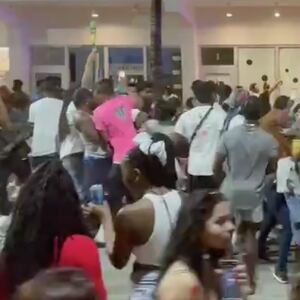The Instagram photos feature macrame bikinis and cutoffs, American flag cowboy hats, white sand beaches, and spiked seltzer. In short: the typical trappings of Spring Break on Florida’s Redneck Riviera.
But underneath these pictures, the student at the University of Georgia who posted them offered a clue of what was different a year after the coronavirus pandemic hit America.
“Sometimes u just gotta take Spring Break into your own hands #fakebreak.”
In an effort to prevent a replay of last year’s Spring Break, which helped kick off the first nationwide wave of coronavirus cases, many universities have taken the unprecedented step this year of canceling the ultimate hedonistic holiday. In some cases, schools have replaced it with a series of on-campus study or “wellness days.” The motive, in the words of the University of Alabama, is clear: keep kids on campus and “mitigate risks associated with travel.”
But even if colleges have canceled Spring Break, many of their students have had other ideas. In the last week, hundreds of students from schools in Alabama, Georgia, Tennessee, and Florida have DIY-ed the holiday, flocking to the beaches and bars along Florida’s 30A highway, just as they’ve done in years past, posting their exploits on social media. And this, epidemiologists say, could set the country’s fight against coronavirus back months.
“The kids are still coming,” said Bill York, owner of Foghorn’s Liquors, a bar in Panama City Beach. “They’re teenagers, come on. They’re out here to eat, drink, be merry, and get laid. It’s what they do.
While the vaccine rollout has gained steam, the virus is still spreading at a high rate, with 57,000 new cases diagnosed on Monday alone. One day earlier, Dr. Anthony Fauci, the nation’s top infectious-disease expert, warned that the U.S. was likely following in Europe’s footsteps and headed for a third wave in the next few weeks.
“It’s potentially a very large problem,” Dr. William Schaffner, a professor of preventive medicine and infectious disease at Vanderbilt University, told The Daily Beast of rogue Spring Breakers.
“Young people, they’re getting together, they’re close with each other, they’re not wearing masks,” he added, before echoing York’s point, albeit more delicately. “Yes, on the beach you can spread apart, but then there are the bars, the hotels, the romances.”
“We’re going to have another wave, because they’ll go back to their respective universities and homes, and there will be outbreaks,” he concluded.
A representative from the University of Tennessee, Knoxville, told The Daily Beast that while the university hadn’t banned spring travel, per se, it was hoping that students would not be as likely to do so.
“We changed our academic calendar this year to limit potential travel-related spread of COVID-19 as much as possible,” said Owen Driscoll, assistant director, news and information at the University of Tennessee, Knoxville, in a statement. "We consistently urge our students to follow health and safety guidelines while away from campus, and we have extensive health and safety measures on campus—including a mask requirement, social distancing, health screenings, testing, and contact tracing operations—to limit spread of COVID-19.”
The Daily Beast reached out to several other universities—Auburn University, Florida State, and the Universities of Alabama, Mississippi and Georgia—that canceled their Spring Breaks but did not receive a response.
From afar, fear of repercussions on campus seemed mild, with sororities openly flouting their school’s policy, posting photo series from their official Instagram accounts suggesting that they endorsed Spring Break travel.
Over the weekend, the Instagram account of Auburn’s Chi Omega sorority posted a picture of half a dozen girls in denim shorts and Birkenstocks relaxing by the Crepes du Soleil food truck at Santa Rosa Beach, Florida.
“LIVING for these #WELLNESSDAY vibes!!” the caption said, a reference to the standalone class holiday Auburn had given its students in place of Spring Break. “Feeling well rested and ready for more adventures ahead this weekend! #ChiOmega.”
In a statement to The Daily Beast, Auburn’s Chi Omega sorority said, “The health and safety of Chi Omega members is our top priority. The recent photos featured on our social media represent individuals living in close quarters/same households who have been adhering to COVID protocols. While neither Chi Omega nor Auburn University currently prohibit student travel, we expect each of our members to closely follow the guidance issued by the CDC, and this is something we communicate with them about regularly.”
But the problem of traveling even with members of the same household, according to Schaffner, is that it rarely stays this way.
Late last week, Parker Grass, a freshman at the University of Tennessee, Knoxville, hit Seagrove Beach with one of his fraternity brothers and a mutual friend at the University of Georgia. They intentionally kept their group small because of COVID concerns, he told The Daily Beast.
But the surprise highlight of the week, he said, was running across a group of guys from his same fraternity at Ole Miss. They started hanging out immediately.
“One of the things I’m learning is that Oxford is totally opening up now. Things are really different there from what’s been going on in Knoxville,” Grass said, referring to the town where Ole Miss is located.
And hanging out with Mississippians, especially in Florida, is now riskier than ever. Earlier this month, the Republican governors of Mississippi and Texas repealed their state’s mask mandates and lifted capacity restrictions on restaurants and bars. This move put them in the same league as Florida, where Gov. Ron DeSantis, one of Trump’s most vocal supporters and COVID’s most fervent deniers, has never instituted a mask mandate in the state and has allowed restaurants and bars to operate at 100 percent capacity since September.
“This is not a recipe for coherent, sane, cautious public health policy at the present time,” Schaffner told The Daily Beast.
The Florida Department of Public Health, the health departments for Bay and Walton Counties, and the governor’s office did not respond to a request for comment from The Daily Beast.
Auburn’s Chi Omega sorority was far from alone in creatively interpreting their university’s wellness days. Dozens of students at Auburn and other colleges posted pictures with captions—if not actions—that acknowledged their celebrations were far from kosher.
On Instagram, a member of Alpha Gamma Delta sorority at Auburn—which did not immediately respond to a request for comment—posted a picture of herself and 19 friends on Seagrove Beach, along with the caption, “happy wellness week.”
And the Zeta Tau Alpha sorority at the University of Georgia used its official Instagram account to show off a photo series of beach-crazed members hugging in the tide, along with the caption, “an instructional break well spent.” The sorority did not respond to a request for comment from The Daily Beast.
Although many of these photos appear to be taken from the openness and relative safety of the beach, both locals and college students stressed that’s far from the only place where pandemic-era Spring Break parties happen.
In Panama City, where an anti-Spring Break ordinance passed in 2015 bans drinking on the beaches for the entire month of March, bars are a major social hub. And in towns where beach drinking is legal, underage drinking is still heavily policed, pushing a lot of the activity into condos and hotel rooms.
“Drinking on the beach here, it’s a waste of time,” York, the bar owner, said.
York said that this year had been quieter than Spring Breaks in the past, but he expected it to pick up throughout the month, even with college Spring Breaks technically off the calendars.
“You think that’s going to stop them? They’ll still come down here,” he said.
The irony, of course, is that for many students, the stress and restrictions brought about by COVID have made Spring Break feel even more like a necessity.
“I don’t get to see a lot of my friends anymore,” said Grass who, unlike his travel companions, has spent much of his semester studying from home. “So going out to dinner and just not thinking about COVID and college, just living in the moment and having a good time—it’s been great.”
For Jason Allen, a junior who flew in from the University of Utah, which did not immediately respond to a request for comment, pinning down a highlight was tough. Hanging out on the beach was pretty great. And so were the clubs and “getting to meet people from around the U.S.”
But the best part, he said, was the vacation from thinking about COVID.
“It was honestly so in the moment that I did not worry about it too much,” he said.



